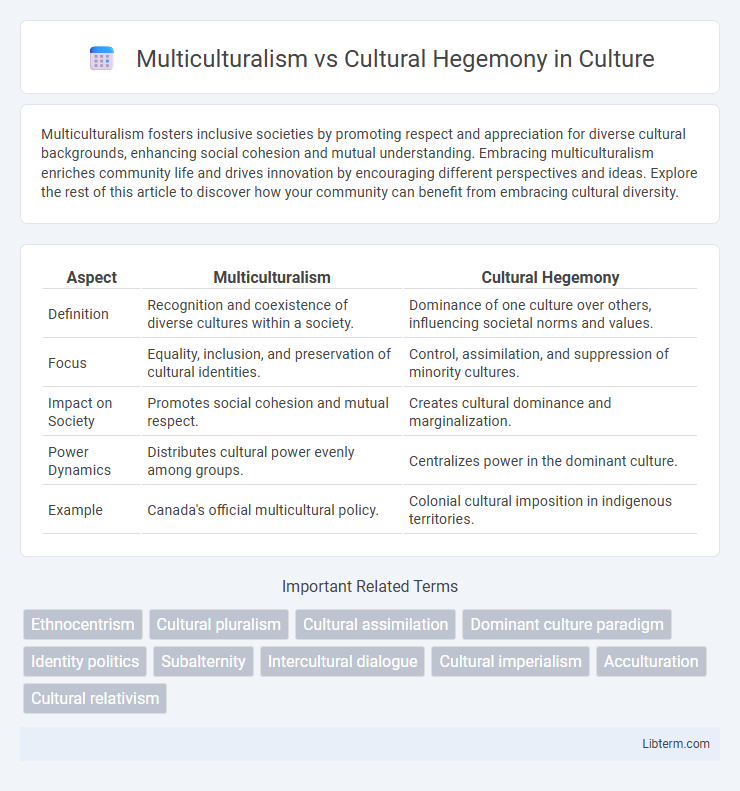Multiculturalism fosters inclusive societies by promoting respect and appreciation for diverse cultural backgrounds, enhancing social cohesion and mutual understanding. Embracing multiculturalism enriches community life and drives innovation by encouraging different perspectives and ideas. Explore the rest of this article to discover how your community can benefit from embracing cultural diversity.
Table of Comparison
| Aspect | Multiculturalism | Cultural Hegemony |
|---|---|---|
| Definition | Recognition and coexistence of diverse cultures within a society. | Dominance of one culture over others, influencing societal norms and values. |
| Focus | Equality, inclusion, and preservation of cultural identities. | Control, assimilation, and suppression of minority cultures. |
| Impact on Society | Promotes social cohesion and mutual respect. | Creates cultural dominance and marginalization. |
| Power Dynamics | Distributes cultural power evenly among groups. | Centralizes power in the dominant culture. |
| Example | Canada's official multicultural policy. | Colonial cultural imposition in indigenous territories. |
Understanding Multiculturalism: Core Principles and Values
Multiculturalism emphasizes the coexistence and equal respect of diverse cultural identities within a society, promoting inclusivity and social cohesion through recognition of cultural differences. Core principles include cultural pluralism, mutual respect, and the affirmation of minority rights, ensuring that multiple cultural perspectives contribute to the social fabric. This framework contrasts with cultural hegemony, where dominant groups impose norms, limiting the expression and influence of marginalized cultures.
Defining Cultural Hegemony: Origins and Modern Manifestations
Cultural hegemony, a concept developed by Antonio Gramsci, refers to the domination of a culturally diverse society by the ruling class, who manipulate the culture to impose their worldview as the societal norm. Originating in Marxist theory, it highlights how power structures maintain control not only through political or economic means but through cultural institutions such as media, education, and religion. In modern society, cultural hegemony manifests in the pervasive influence of dominant cultural narratives that marginalize minority voices and uphold systemic inequalities.
Historical Perspectives on Cultural Domination
Historical perspectives on cultural domination reveal how cultural hegemony often emerged through colonialism, where dominant powers imposed their language, values, and social norms on subjugated populations. Multiculturalism arose as a response, advocating for the recognition and preservation of diverse cultural identities within societies historically shaped by unequal power dynamics. These contrasting frameworks highlight ongoing struggles between maintaining cultural plurality and confronting systemic cultural assimilation enforced by hegemonic forces.
The Benefits of Embracing Multicultural Societies
Embracing multicultural societies fosters innovation, creativity, and economic growth by integrating diverse perspectives and skills. This cultural diversity enhances social cohesion through greater empathy, mutual respect, and understanding among different ethnic and cultural groups. Multiculturalism counters cultural hegemony by promoting inclusivity and equity, ensuring minority voices are represented and valued within the social and political framework.
Cultural Hegemony’s Impact on Minority Groups
Cultural hegemony imposes dominant group values and norms, marginalizing minority groups and limiting their cultural expression. This power dynamic perpetuates social inequalities by controlling education, media, and institutions, which reinforces stereotypes and suppresses diverse identities. As a result, minority communities face systemic barriers to representation, social mobility, and preservation of their cultural heritage.
Multiculturalism in Education and Social Policy
Multiculturalism in education promotes inclusive curricula that reflect diverse cultural perspectives, fostering social cohesion and mutual respect among students from varied backgrounds. Social policies supporting multiculturalism emphasize equal representation, anti-discrimination measures, and access to resources, enabling marginalized communities to participate fully in society. This approach counters cultural hegemony by challenging the dominance of a single cultural narrative and empowering multiple identities within the public sphere.
Media Representation: Multicultural Narratives vs Dominant Cultures
Media representation often reflects the tension between multicultural narratives and cultural hegemony, where dominant cultures shape mainstream content and marginalize minority voices. Multiculturalism in media promotes diverse stories that highlight various ethnic, racial, and cultural experiences, challenging the uniformity imposed by hegemonic media practices. This dynamic influences public perception, shaping societal values and either reinforcing cultural dominance or fostering inclusivity through varied storytelling.
Social Cohesion: Challenges and Opportunities in Diverse Communities
Multiculturalism promotes social cohesion by recognizing and valuing diverse cultural identities, fostering inclusivity and mutual respect within communities. Cultural hegemony can undermine social cohesion by imposing dominant cultural norms that marginalize minority groups and suppress cultural expression. Addressing these challenges requires policies that balance cultural recognition with shared values to create opportunities for dialogue and cooperation in diverse societies.
Resistance to Cultural Hegemony: Movements and Strategies
Resistance to cultural hegemony manifests through grassroots movements, indigenous rights activism, and efforts to preserve local languages and traditions. These strategies challenge dominant cultural narratives by promoting pluralism, fostering intercultural dialogue, and leveraging digital platforms for alternative media representation. Collective actions such as protests, educational reforms, and community organizing undermine hegemonic power structures and advocate for equitable cultural recognition.
Building Inclusive Societies: The Path Forward
Building inclusive societies requires embracing multiculturalism, which values diverse cultural identities and promotes mutual respect and equality among groups. Cultural hegemony undermines this goal by imposing dominant cultural norms that marginalize minority voices and perpetuate social inequalities. Prioritizing policies that encourage intercultural dialogue and equitable representation fosters social cohesion and empowers all community members.
Multiculturalism Infographic

 libterm.com
libterm.com